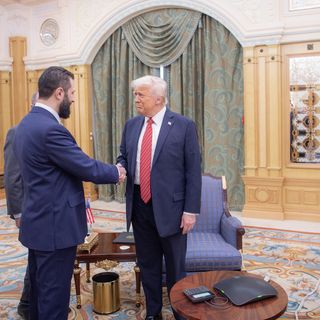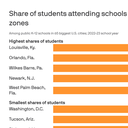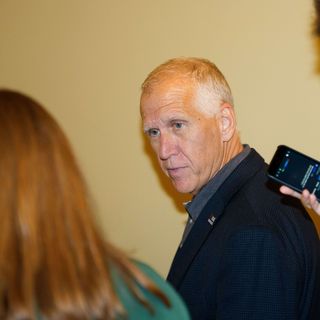Tech giants play musical chairs with foundation models
There are five consumer-tech giants — but only three leading AI foundation models.
Why it matters: When the deal-making music stops, someone's going to be left out.
Driving the news: Apple is talking with both Anthropic and OpenAI about using their foundation models to power Siri, after in-house efforts to upgrade Apple's voice assistant have faltered, Bloomberg reported Monday.
- Once cutting edge, Siri is now a glaring anachronism in a world enthralled by the verbal and vocal agility of LLMs — and an irritating reminder to everyone at Apple of how far they've lagged behind in the voice-assistant competition.
The big picture: Every big player in tech is working on their own foundation models — the biggest and most ambitious large language models that fuel ChatGPT and all the other services at the heart of the generative AI revolution.
- OpenAI, Anthropic and Google seized the high ground early and have stayed ahead of the pack, both in scale, innovative advances and subtle refinements.
- Important runners-up range from Elon Musk's X.ai to France's Mistral and China's DeepSeek.
Most of tech's five trillion-dollar giants already have a match in the foundation-model game, but there's constant movement, and the music is still playing.
Google is the only one of the giants that has built its own top-tier model.
- Its researchers made the breakthroughs that power LLMs today, but it was slow to share advances with the public, opening the door for OpenAI to stun the world with ChatGPT in November 2022.
- Since then Google has poured enormous resources into Gemini — once known as Bard — and begun rebuilding most of its products, including its dominant search engine, around the model.
Microsoft tied its future to OpenAI early in the game with a gigantic investment and a commitment to deploying OpenAI models to the vast installed base of Microsoft users.
- But the alliance has frayed, and the two companies are locked in high-stakes negotiations for an amicable breakup.
- Microsoft also has its own in-house foundation model project, but that has yet to surface.
Meta got a later start and bet heavily on an open-source strategy with its Llama model family.
- But disappointment in the progress made by the most recent Llama flagship model has forced a rethink, per the New York Times.
- The Times reported last week that Meta execs had discussed "de-investing" in Llama, though the company denies that.
- Meanwhile, CEO Mark Zuckerberg has poached a number of OpenAI researchers and added ScaleAI founder Alexandr Wang and former Github CEO Nat Friedman to his roster.
- Zuckerberg announced Monday these new hires would lead a unit called Meta Superintelligence Labs that will bring together all of Meta's foundation model work.
Amazon has invested in its own families of models to offer its cloud customers, chiefly Nova and Titan.
- But for its effort to improve the popular but aging Alexa voice assistant, Amazon found that Nova alone couldn't handle the job and pulled Anthropic's Claude in as well.
- Amazon has also made multiple investments in Anthropic.
All this means that Apple's choices are limited.
- Apple wouldn't turn to Google — not only because both companies are defending giant antitrust lawsuits that might make a deal perilous, but also for historical-cultural reasons.
- Apple never forgave Google for building Android, though it still takes Google's billions for making Google search the iPhone default.
That leaves OpenAI and Anthropic — both of which Apple has explored partnering with, per Bloomberg.
- Siri already lets users route questions to OpenAI's ChatGPT.
- But a team tasked with evaluating Apple's external options found that Anthropic's Claude was the best candidate for the broader Siri upgrade, Bloomberg reported.
Yes, but: Apple could still decide to redouble its internal efforts instead.
- The company has a long history of avoiding shipping half-baked products and letting projects take as long as they need to become what Apple thinks of as "great."
- But the pace of AI change is putting that strategy to its toughest test yet.
Zoom out: Driving and shaping all these firms' deals and choices is the war for AI talent, with both giants and startups desperately throwing money at a relatively small number of researchers.
- Each company hopes that its team will be able to deliver on the astronomical promises executives have made about AI's transformative benefits and ultimate profits.
- But not everyone can win — and each of the tech industry's previous waves has had only one or two victors.





















